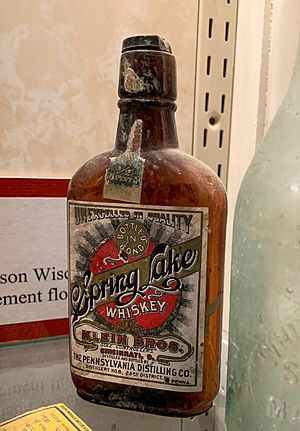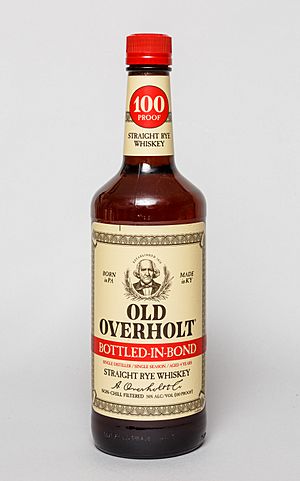Bottled in bond facts for kids
Bottled in bond is a special label for certain American-made drinks. It means the drink has been made, aged, and bottled following strict rules from the United States government. These rules were first created in a law called the Bottled-in-Bond Act of 1897.
This law was made because, a long time ago, some American whiskeys were not pure. People were adding things to them that shouldn't be there. The Bottled-in-Bond Act helped make sure these drinks were real and pure. It also gave companies a reason to follow the rules, and it helped the government collect taxes. Even though the rules can apply to different types of drinks, most "bottled-in-bond" products you see are whiskeys.
To get the "bottled-in-bond" label, a drink must meet several important rules:
- It must be made by one distiller at one distillery during a single six-month period (either January to June or July to December).
- It must be aged for at least four years in a special, government-supervised warehouse.
- It must be bottled at exactly 100 proof, which means 50% alcohol by volume.
- The label must clearly show where it was distilled and where it was bottled.
- Only drinks made in the United States can be called "bottled-in-bond."
Some people think "bottled-in-bond" means a drink is very high quality. Others in the industry don't use the term much anymore. However, because these drinks come from one distiller and one season, they can show off the distiller's skill. This is similar to how a "single malt" or "single barrel" whiskey highlights a specific product.
Why the Bottled-in-Bond Act Was Created

One main reason for the Bottled-in-Bond Act was to set a clear standard for the quality of Bourbon whiskey. Before this law, many whiskeys sold as "straight whiskey" were not pure. People would sometimes add things like coloring or flavorings to make them seem better. This made it hard for people to trust what they were buying.
Because of these problems, there was a need for a way to guarantee that a drink was truly what it claimed to be. The law also helped with taxes. Distilleries could wait to pay taxes on their whiskey until it had finished aging. Government agents watched over the special warehouses to make sure everything was counted correctly. This helped ensure the taxes would be paid later.
A group of whiskey makers, led by Colonel Edmund Haynes Taylor, Jr., worked with the government to pass this important law. To make sure companies followed the rules, government agents were placed in charge of the special "bonded warehouses" at the distilleries.
Besides bourbon, some companies also make "bottled-in-bond" rye whiskey, corn whiskey, and applejack.
 | Kyle Baker |
 | Joseph Yoakum |
 | Laura Wheeler Waring |
 | Henry Ossawa Tanner |


